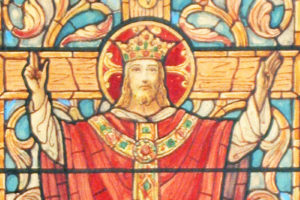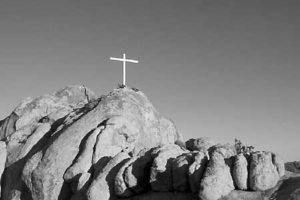
[The Divine Office begins the Liturgical Day with the Invitatory Psalm, usually Psalm 95, broken up into stanzas, with an antiphon repeated with each stanza, often varying by day. The entire combination is listed out below, using the Antiphon for Sundays and weekdays of Lent into Holy Thursday. Prior to the Invitatory Psalm is an introductory phrase from Psalm 51.]
Lord, open my lips.
— And my mouth will proclaim Your Praise.
Encourage each other daily, while it is still today (Hebrews 3:13)
Come, let us worship Christ the Lord, Who for our sake endured temptation and suffering.
Come, let us sing to the Lord
and shout with joy to the Rock Who Saves us.
Let us approach Him with Praise and Thanksgiving
and sing joyful songs to the Lord.
Come, let us worship Christ the Lord, Who for our sake endured temptation and suffering.
The Lord is God, the Mighty God,
the Great King over all the gods,
He holds in His Hands the depths of the earth
and the highest mountains as well.
He made the sea; it belongs to Him,
the dry land, too, for it was formed by His Hands.
Come, let us worship Christ the Lord, Who for our sake endured temptation and suffering.
Come then, let us bow down and worship,
bending the knee before the Lord, our Maker.
For He is our God, and we are His People,
the Flock He Shepherds.
Come, let us worship Christ the Lord, Who for our sake endured temptation and suffering.
Today, listen to the Voice of the Lord:
Do not grow stubborn, as your fathers did
in the wilderness,
when at Meribah and Massah
they challenged me and provoked me,
Although they had seen all of my works.
Come, let us worship Christ the Lord, Who for our sake endured temptation and suffering.
Forty years I endured that generation.
I said, “They are a People whose hearts go astray
and they do not know My Ways.”
So I swore in my anger,
“The shall not enter into my rest.”
Come, let us worship Christ the Lord, Who for our sake endured temptation and suffering.
Glory to the Father, and to the Son, and to the Holy Spirit:
as it was in the beginning, is now, and will be for ever.
Amen.
Come, let us worship Christ the Lord, Who for our sake endured temptation and suffering.


The Divine Office also indicates that Psalm 100, Psalm 67 or Psalm 24 may be used, providing translations for those psalms as well.
It also indicates that the psalm may be omitted when the Invitatory precedes Morning Prayer.
Note that, appended to the psalm is a version of the Glory Be slightly different than what many laity are familiar with.
Note also that this Psalm helps us begin a day by contemplating, with a focus on God’s Greatness, a grand sweep of God the Father’s Relationship with us. It calls us to encounter Him with Praise and Joy, yet reminds us of our human frailty and need to guard against going astray from Him.
We are, indeed, invited, with an invitation to Come to God, Praising and singing in a spirit of joy. We give thanks.
Giving thanks, we contemplate God’s All-Powerful Role of Creator, above all, Who Created all, including the physical universe that seems to dwarf our own physical existence.
So, while in joy, we also bow before God in reverence as well as thanks.
And we encounter Him in a personal relationship. We are His Flock and He Shepherds us. We are His People. We are a People, we form a People, joined together as a People, and what makes us a People is that we are God’s People. We are His People.
Our identity, in part, comes from our shared identity as a People, that is defined by, and draws Meaning from, God and our Being God’s People.
At the same time, mindful of our human frailty, and need for steadfast effort to sustain a proper life and good relationship with God, Psalm 95 then recalls the pitfalls and failings that we can encounter if we are not careful, by recalling the weaknesses and failings of those going before us. Specifically it recalls the long exodus in the desert, and the weakness of those who lost heart and started straying from God, testing God’s patience, and even challenging God. They were given a Promise by God, were coaxed to say yes, were being led on a Journey by God towards that Greater Promise, yet weakened in the face of unknowns.
We show time and again that we are needful of God’s Help and Mercy, including in our weakness straying from God, even while following a Journey He marks out for us.
The psalm also reminds us that God is willing to hold us to account, including if we persist in going astray and never come back. So let us be exhorted to constantly ask God’s Help, and constantly strive to take joy in coming to God and persevering joyfully in efforts to follow Him.
We then give Glory to God, after the Psalm, giving Glory to All Three Persons of the Most Holy Trinity, with the Glory Be, also Confessing Testimony to the fact that God is Eternal and His Glory is Eternal, from the beginning, to the present, and for all time. (God, of course, is even Greater beyond that, Infinitely Great, and Existing beyond and outside time itself. Eternity extends well beyond time, with the realm of time, the temporal realm being yet another part of Creation that God brought into existence.)





